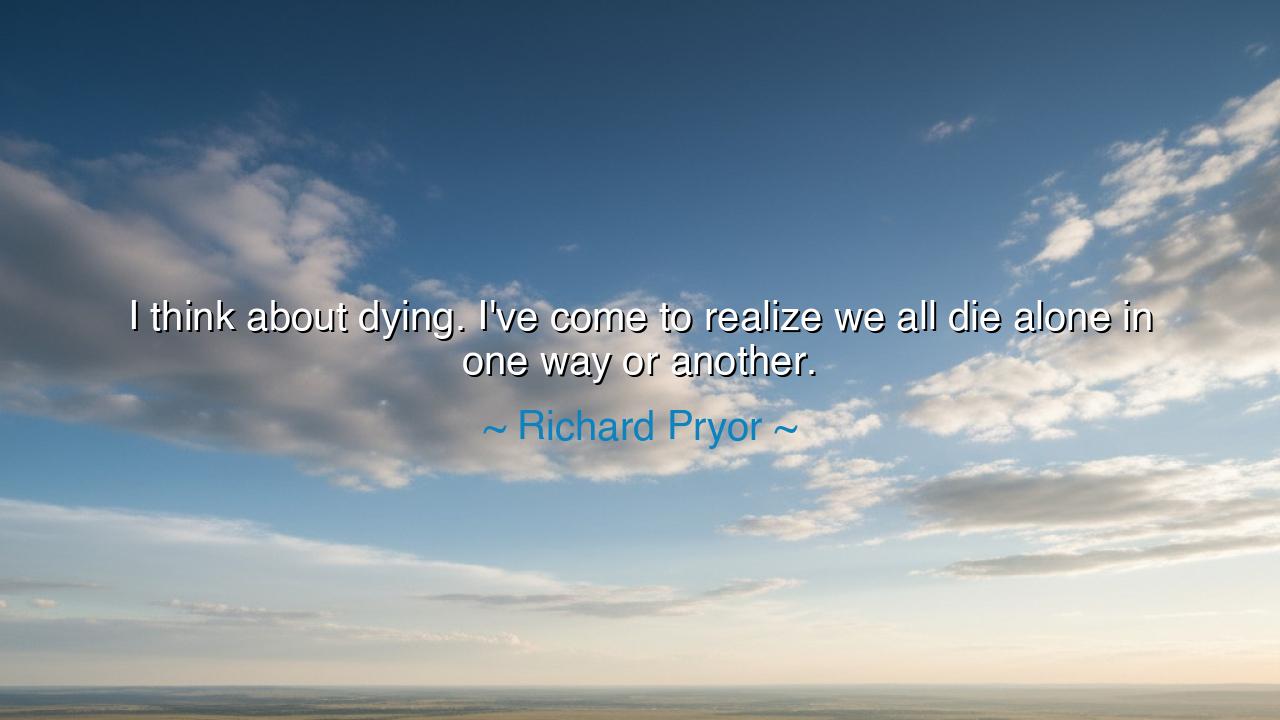
I think about dying. I've come to realize we all die alone in one






“I think about dying. I've come to realize we all die alone in one way or another.” — Thus spoke Richard Pryor, the prophet of laughter and pain, whose comedy was born not from ease, but from the fire of experience. In this solemn reflection, the man who once made the world tremble with laughter bares a truth that silence itself cannot deny — that death is the final solitude of every soul. Yet his words are not merely about dying; they are about living, about understanding the profound individuality of our journey through existence. To die alone, as he says, is not tragedy — it is the reminder that within each of us lies an unshared space, sacred and unspoken, where only our own spirit may dwell.
The origin of this quote lies in Pryor’s later years, when illness had begun to humble his once-uncontainable body. Having faced the near-destruction of his life through fire, addiction, and fame, he had seen the edges of mortality and returned with insight. The man who had once set himself ablaze in despair now spoke with the serenity of one who had seen beyond fear. His awareness of solitude came not from melancholy, but from revelation — the recognition that life’s deepest moments, whether joy or pain, are faced in the silence of one’s own heart. No crowd, no applause, no love can accompany us into that final mystery.
The ancients, too, spoke of this sacred solitude. Marcus Aurelius, emperor and philosopher, wrote in his meditations, “Every man dies alone, but the universe remains.” To him, this truth was not despair but release — the understanding that death, like birth, is part of nature’s order. The Stoics taught that the wise do not fear the loneliness of death because they have already made peace with the loneliness of life. Every choice, every thought, every secret hope is forged in the silence of our own mind. Pryor, though born centuries later, spoke in that same spirit — as a man who had seen the faces of fame, love, and suffering, and discovered that all are fleeting compared to the eternity within.
There is, too, a paradox in Pryor’s confession. He, who made millions laugh, whose art united strangers in shared joy, admits that we are alone in the end. Yet that very confession is an act of communion — an offering of truth that connects him to all who hear it. For in acknowledging our loneliness, we discover universality. Every human heart knows the quiet ache of being misunderstood, the distance between soul and soul. But in speaking it aloud, Pryor transformed isolation into kinship. This is the alchemy of art: to turn personal solitude into collective understanding.
Consider the story of Socrates, condemned to death yet serene in his final hours. His friends wept, but he smiled, saying that the philosopher should welcome death as the soul’s liberation from the prison of the body. Though surrounded by companions, he drank the hemlock alone, facing the unknown as only he could. Like Pryor, Socrates knew that while others may walk beside us, none can take the final step for us. Death, and by extension life itself, is a journey only the individual can truly make. It is this awareness that grants dignity to our existence — the realization that our solitude is not a curse, but a calling.
And yet Pryor’s words are not a surrender to despair. They are a challenge: if we must die alone, let us live fully before that day comes. Let us speak truth while we still have a voice, love deeply while we still have time, and create while our hands still move. Solitude, when embraced, does not isolate; it clarifies. It teaches us what truly matters — not the noise of approval or the masks we wear, but the simple, radiant act of being ourselves. Pryor’s own life, filled with both chaos and redemption, stands as proof that even in the face of mortality, one can laugh, love, and leave behind light.
Therefore, let this be the lesson: do not fear the solitude of existence, for it is the crucible of authenticity. Every soul must one day stand alone before the silence of eternity — but until that moment, let us use our aloneness as strength. Seek not to escape it, but to understand it. Build connections not out of need, but out of compassion. Love others deeply, yet remember: it is your own courage, your own integrity, your own flame that must guide you through the dark.
For as Richard Pryor reminds us, in the end, we all die alone, but we need not live as if we are strangers to one another. In sharing our solitude, in speaking our truth, we touch something eternal in each other — the part that transcends loneliness, the part that never dies. Thus, embrace your solitude, live your truth, and laugh boldly at the mystery of it all — for even in your aloneness, you belong to the great human story, shining and unbroken.






AAdministratorAdministrator
Welcome, honored guests. Please leave a comment, we will respond soon